
Vertical Integration
Vertical Integration in farming means controlling multiple steps of food production, from growing crops to selling final products. It's like owning the whole process - imagine a farm that not only grows tomatoes but also makes and sells their own tomato sauce. This approach helps farms have more control over their business and potentially make more money by cutting out middlemen. When candidates mention vertical integration on their resumes, they're showing they understand how to manage or work within a system that handles multiple parts of the farming process.
Examples in Resumes
Managed Vertical Integration project combining crop production with direct-to-consumer sales
Implemented Vertically Integrated operations by establishing on-site processing facility
Developed Vertical Integration strategy connecting farm production to retail distribution
Typical job title: "Farm Operations Managers"
Also try searching for:
Where to Find Farm Operations Managers
Professional Organizations
Job Boards
Industry Networks
Example Interview Questions
Senior Level Questions
Q: How would you develop a vertical integration strategy for a mid-sized farm?
Expected Answer: A strong answer should discuss analyzing current operations, identifying opportunities for expansion (like processing or direct sales), considering resource requirements, and creating a step-by-step implementation plan that manages risks and costs.
Q: What are the main challenges in managing a vertically integrated agricultural operation?
Expected Answer: Look for answers that address managing multiple business aspects, coordinating different teams, ensuring quality control across all stages, handling increased operational complexity, and maintaining efficiency while scaling operations.
Mid Level Questions
Q: What experience do you have with different aspects of the agricultural supply chain?
Expected Answer: Candidate should be able to discuss experience in at least 2-3 areas such as production, processing, storage, distribution, or sales, showing understanding of how these components work together.
Q: How do you ensure quality control across different stages of agricultural production?
Expected Answer: Should discuss implementing standard procedures, monitoring systems, training staff, and maintaining consistency across different operational stages.
Junior Level Questions
Q: What do you understand by vertical integration in farming?
Expected Answer: Should be able to explain the basic concept of controlling multiple steps in the farming process, from production to sale, with simple examples.
Q: What are the benefits of vertical integration for a farm?
Expected Answer: Should mention increased control over product quality, better profit margins, reduced dependency on external parties, and direct relationship with customers.
Experience Level Indicators
Junior (0-2 years)
- Basic understanding of farm operations
- Knowledge of food safety regulations
- Experience with one aspect of farming operations
- Basic business management skills
Mid (2-5 years)
- Management of multiple farm operations
- Supply chain coordination
- Quality control implementation
- Team supervision experience
Senior (5+ years)
- Strategic planning and implementation
- Multiple facility management
- Business development expertise
- Large team leadership
Red Flags to Watch For
- No hands-on farming or agricultural experience
- Lack of business management knowledge
- Poor understanding of food safety regulations
- No experience with team coordination or management
Related Terms
Need more hiring wisdom? Check these out...

How Internal Gig Marketplaces Revolutionize Employee Development

Unlocking Internal Talent: Why Internal Mobility Is Your Secret Weapon in Talent Acquisition

Workforce Solutions Aggregators: The Next Big Thing You Didn't Know You Needed

